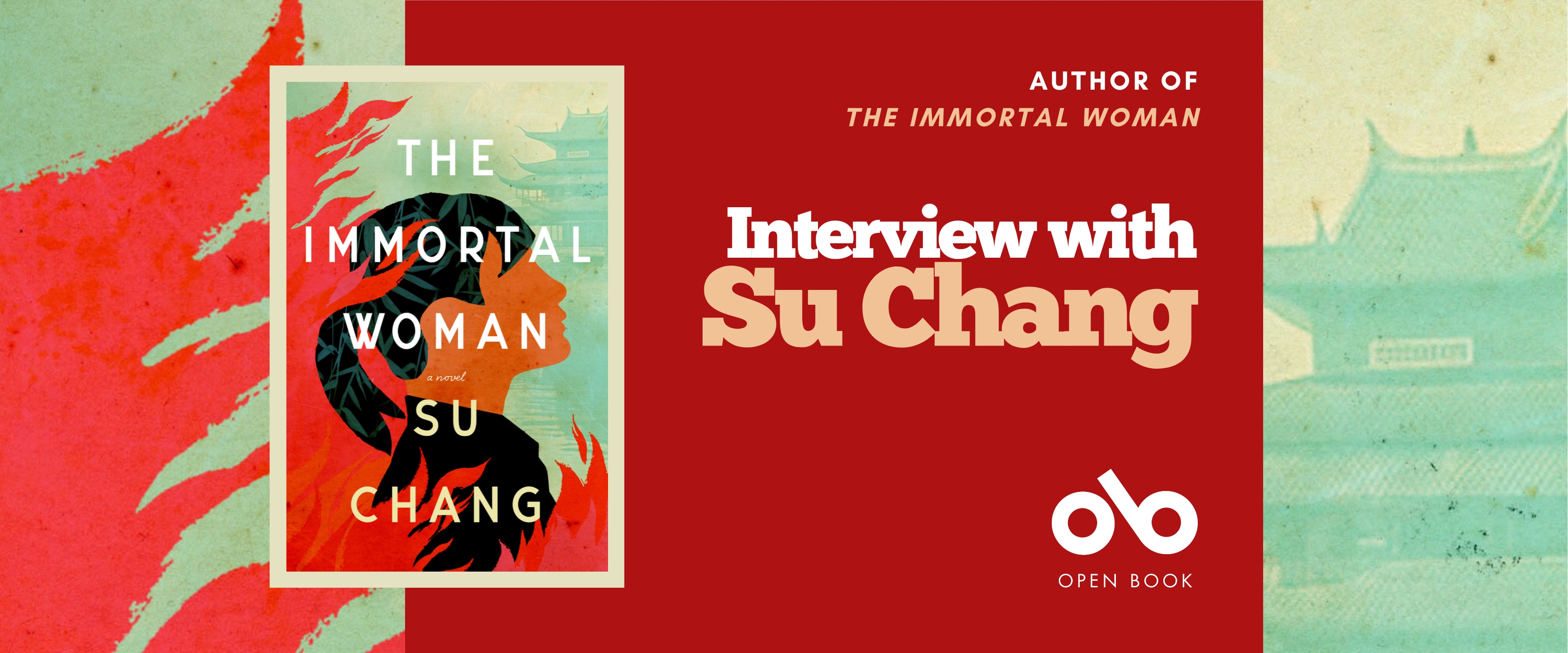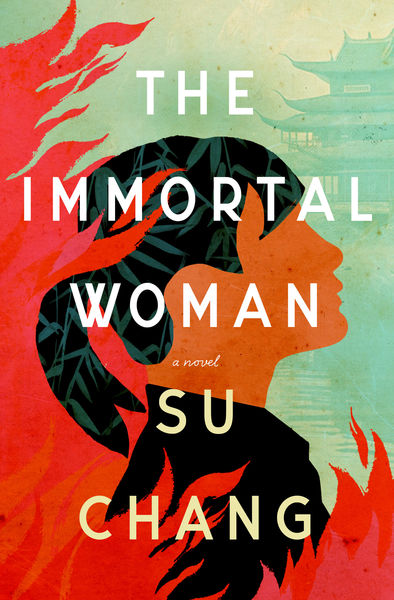Su Chang's New Novel is a Sweeping and Powerful Intergenerational Drama
Born in Shanghai, author Su Chang has long admired certain Canadian writers and their ability to create sweeping, multicultural narratives that bridge gaps and challenge the literary status quo. Now, she adds her own unique voice to the CanLit scene with a striking new novel.
In The Immortal Woman (House of Anansi Press), we follow Lemei, who emigrated west after losing all hope for her home country of China. She was once a Red Guard leader as a student in the 1960s, until one particularly brutal act of violence that she was involved in shook her worldview and compelled her to change her life forever.
What follows in an intergenerational tale about a mother who has to reckon with this past, and a daughter named Lin who fully immerses herself in an American identity, batting aside any traditional Chinese traits and practices in order to truly become a "Westerner." But as China grows into a superpower over the years, Lemei begins to show nationalistic tendencies again, putting Lin at odds with her mother and leading them both down a winding, tragic path as they grapple with these identities and very human conflicts.
We're very excited to share this Storytellers Fiction Interview with the author, which is a brand new series focused on those who carry stories and their place in the literary world.
Open Book:
Which authors have inspired you and/or influenced your work?
Su Chang:
Growing up in China, I read and reread the Four Great Classical Novels (Journey to the West, Outlaws of the Marsh, Romance of the Three Kingdoms, Dream of the Red Chamber), as well as novels and stories by Lu Xun, Lin Yutang, Wang Anyi, and Shen Congwen (my personal favorite). I was and still am a fan of Russian literature (Tolstoy, Dostoevsky, Alexander Pushkin). If I had a teeny penchant for melodrama, I know where it came from.
As an adult immigrant in North America, many contemporary writers in the Asian diaspora have dazzled me with their unique voices and allowed me to imagine and nurture a little voice inside of me too: Madeleine Thien, Jan Wong, Jack Wang, Ayad Akhtar, Li Yiyun, Weike Wang, Ha Jin, David Henry Hwang, Gish Jen, Celeste Ng, R.F.Kuang, Min Jin Lee, to name a few.
I am also partial to the short stories from female writers like Alice Munro, Lorrie Moore, Elizabeth Stout, Margaret Atwood, Mavis Gallant, Marian Engel.
OB:
What impact would you want your novel collection to leave?
Your CanLit News
Subscribe to Open Book’s newsletter to get local book events, literary content, writing tips, and more in your inbox
SC:
I have several aspirations for my novel. I hope to inject nuanced perspectives into the discourse about China. As an adult immigrant to North America, I often find the media stories about China too black and white. In my fiction, I create deeply flawed heroes and villains with tragic pasts, not only for the great literary tradition, but also to stay true to the authentic historical figures I encountered during my years of research.
My book also seeks to shed light on a unique and under-examined source of “colonial mentality” and internalized racism. Although China as a whole was never formally colonized by foreign powers in the last 200 years, its tumultuous modern history, especially since the Communist Party’s takeover in 1949, has resulted in widespread internalized racism among the Chinese people throughout the 1980s and 1990s. This phenomenon, explored through a mother-daughter narrative, links the political trauma experienced during the Cultural Revolution to the inferiority complex prevalent among later generations. It highlights a correlation between collective historical amnesia and internalized racism.
Moreover, new Chinese immigrants in North America often live in a constant state of tension. On one hand, many of them carry trauma from their country of origin, often making them skeptics, if not downright critics, of China. But to be constantly critical of one’s country of origin erodes one’s sense of identity and pride, and eventually becomes its own source of pain. On the other hand, it can be challenging to find belong in their adopted country, due to their status as visible minorities from a perceived “enemy state,” according to the Cold War mentality displayed by the Western government and media. Their conflictual feelings for their country of birth and the suspicion of “dual loyalties” can take an unrelenting psychological toll. I hope this book can provide a narrative framework that enriches discussions on the future of multiculturalism in our increasingly divided world.
OB:
Where do you see your fiction fitting into any specific traditions in Canadian storytelling?
SC:
There are many rich and diverse traditions in Canadian storytelling. My novel is most connected to two of the key traditions: multicultural narratives, and social and political engagement. As a new Canadian, I am still in awe of Canada’s multicultural society, our privilege to read stories from different communities and cultural perspectives, and the many brilliant writers exploring themes of immigration, identity, and cultural assimilation. Wayson Choy, Dionne Brand, Kim Thuy, Rawi Hage, Shani Mootoo, Judy Fong, Anita Rau Badami, Lindsay Wong, and the list goes on.
CanLit is also renowned for its social and political engagement, and our writers and readers readily embrace challenging subjects and themes. These range from the politics of gender and reproductive rights to religious pluralism, consumerism, the horrors of war, and the effects of colonialism on indigenous peoples. I am proud to offer another socially and politically engaged entry to our great literary tradition.
OB:
Do you see your work or work like it helping to forge a new path in CanLit, or the broader literary landscape?
SC:
“Forging a new path in CanLit” is too grandiose of a way to put it, but I do see my book making a unique contribution. While books from children of immigrants about their immigrant parents are becoming relatively common, as are coming-of-age stories by authors who immigrated as young children, novels that come directly from the perspective of adult immigrants, like this one, remain rare.
OB:
Who are mentors that you’ve found along the way that have made a difference in your literary journey?
SC:
I was lucky to have been mentored, formally or informally, by Joseph Kertes, Thea Lim, Alissa York, and Kim Echlin, who taught me both the craft of writing and the art of writerly living.
The following brilliant authors also helped me in various stages of my long journey to become a debut novelist, and I am incredibly grateful to them: Paola Ferrante, Jess Taylor, Danila Botha, Suzanne Alyssa Andrew, Angel Di Zhang, Lynda Williams, Kathryn Kuitenbrouwer, Jessica Westhead, Anuja Varghese, Tessa Hulls, David Bezmozgis, Anna Julia Stainsby.
OB:
Do you draw from family or community stories in your work? If so, how?
SC:
Long before I put ink to paper, I had been thinking about this book for almost a decade. Growing up in Shanghai in the 80s and 90s, I was often puzzled by the adults around me, by their hidden ire and pain, the daily debates that unveiled old grudges from a tumultuous time that I could barely trace in my history books. Gradually, I came to see myself as belonging to a generation with no history. It was only after I immigrated to North America that I began to have access to the tabooed past of my birth country, and started to make sense of the incongruency that had haunted me my entire life. Over the years, as I labored to find my footing in my adopted country as an adult immigrant, I also spent my evenings and spare time researching – from books, documentaries, lectures, and talks - the modern and contemporary history that was missing from my childhood textbooks. Part of this book was inspired by the experiences of my own family member who was a reluctant student Red Guard leader during the Cultural Revolution, and parts of it were constructed based on narratives, oral histories, and witness accounts uncovered during my research.
_________________________________________
Su Chang is a Chinese Canadian writer. Born and raised in Shanghai, she is the daughter of a former (reluctant) Red Guard leader. Her fiction has been recognized in Prairie Fire’s Short Fiction Contest, the Canadian Authors Association (Toronto) National Writing Contest, the ILS/Fence Fiction Contest, and the Masters Review’s Novel Excerpt Contest, among others.






